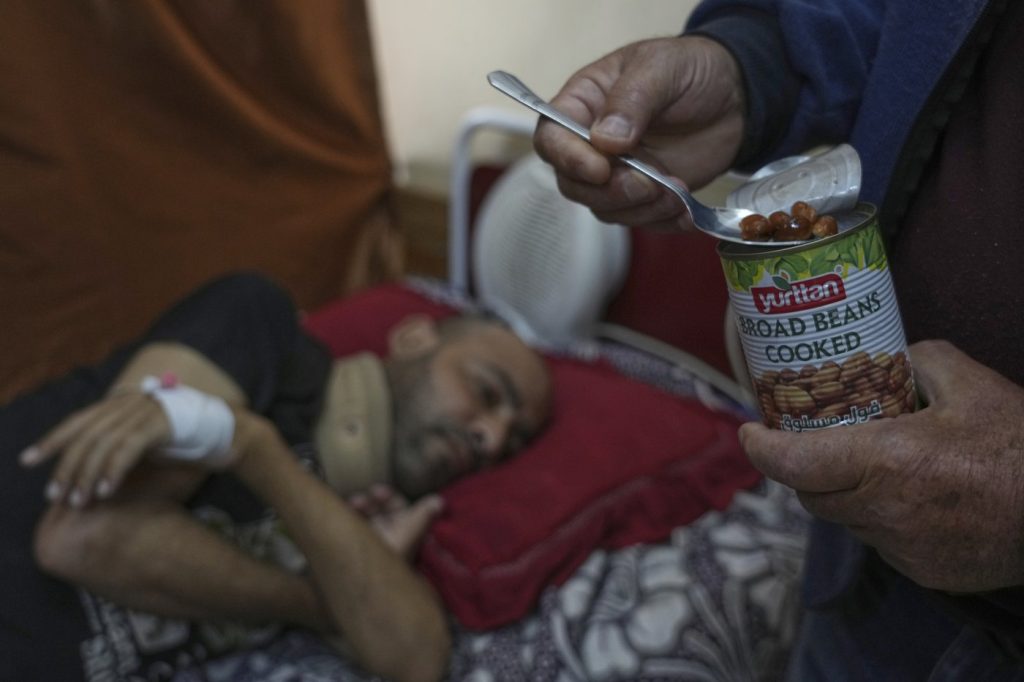KHAN YOUNIS, Gaza Strip (AP) - Amidst the ongoing humanitarian crisis in Gaza, Asmaa Fayez struggles to provide for her 4-year-old son, Ali al-Dbary, who has been hospitalized for a week due to a blocked intestine. Fayez managed to purchase zucchinis at a local market, which are now selling at around $10 per kilogram, a steep increase from less than a dollar before the conflict. She prepared a soup made with the zucchinis and rice, but it was just a small improvement over the canned beans and tuna that have become staple meals.
As hospitals across Gaza find themselves unable to supply food, families must bring whatever they can find for their loved ones. Dr. Khaled Alserr, a general surgeon at Nasser Hospital, reported that most patients have lost weight due to inadequate nutrition, particularly in the past two months. He expressed concern over the lack of nutritional supplements for intensive care unit patients, stating, "Our hands are tied when it comes to making the best choice for patients. Choices are limited."
Food insecurity is worsening as supplies continue to dwindle under Israel’s blockade, now in its third month. Malnutrition is on the rise, with thousands of children suffering from acute malnutrition and 16,000 pregnant women and new mothers facing severe deficits in their diet, according to the U.N. Reports indicate that local food production has substantially declined because Israeli forces have damaged approximately 80% of Gaza’s farmlands and access to remaining arable land has also been restricted.
Fayez believes her son’s health issues stem from a diet primarily consisting of canned goods due to the unavailability of fresh vegetables. Doctors in the hospital are currently unable to provide adequate diagnostic services, lacking essential medical equipment to determine whether Ali requires surgery.
Since hostilities escalated with Hamas's attack on October 7, 2023, during which over 1,200 Israelis died, and after that, Israel's military response led to extensive casualties on the Palestinian side with over 52,000 deaths, including many women and children. This ongoing conflict has resulted in severe restrictions on food and other supplies entering Gaza. Some rights groups have criticized the blockade as a form of "starvation tactic," arguing it constitutes a potential war crime.
Israeli plans to control aid distribution, including the proposal to engage private contractors for the process, have faced backlash from the U.N. and various aid organizations. Such measures may restrict access to food and medical assistance for many Palestinians, especially those in hospitals, making it increasingly difficult for families to support their loved ones.
Another patient, 19-year-old Asmaa Faraj, is recovering from shrapnel wounds sustained during an airstrike that hit a nearby displacement camp. At the hospital, she only had a small bag of dates and a date cookie, highlighting the severe food shortages experienced by patients and their families. Her sister lamented the drastic change in hospital customs, where bringing fruits for sick individuals has been replaced by water bottles due to the shortages.
Mohammed al-Bursh shared his struggle to find adequate food for his son, Sobhi, who lost his left foot and sustained severe spinal injuries from an airstrike three months prior. Even in pain, Sobhi is conscious of the financial strain on his father and seeks to limit his intake to save money. This sentiment reflects the broader reality faced by many families in Gaza, who are grappling with skyrocketing food prices and diminishing supplies as the ongoing conflict wears on.











